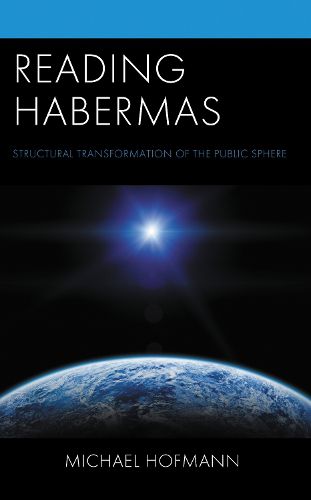Readings Newsletter
Become a Readings Member to make your shopping experience even easier.
Sign in or sign up for free!
You’re not far away from qualifying for FREE standard shipping within Australia
You’ve qualified for FREE standard shipping within Australia
The cart is loading…






Reading Habermas: Structural Transformation of the Public Sphere dissolves Habermas's monolithic stylization to precisely access his seminal distinction between the purely political polis of antiquity, which excludes the private economy from the res publica, and the modern public sphere with its rational-critical discourse about commodity exchange and social labor in the political economy. Deconstructing the uniform mold of Structural Transformation's narrative about a rise and fall of the bourgeois public sphere in modernity also allows to identify and understand the ideology-critical methodologies of Habermas's theory reconstruction of Kant's ideal of the liberal public in the context of the French Revolution. Readers of this guide realize that Habermas's interpretation of a sociological and political category with the norms of constitutional theory and intellectual history causes the "collapsing of norm and description" he acknowledged in 1989 and thus frequent misunderstandings about the historical validity of Structural Transformation's ideal-type derived from Condorcet's absolute rationalism and Kant's "unofficial" philosophy of history. Specifically, the guide explains that Habermas's key construct of a "morally pretentious rationality" of the bourgeois public sphere entirely depends on the claim about "natural laws" harmoniously regulating the economy. While neoliberalism still maintains this claim, Hegel "decisively destroyed" it already in 1821.
$9.00 standard shipping within Australia
FREE standard shipping within Australia for orders over $100.00
Express & International shipping calculated at checkout
Reading Habermas: Structural Transformation of the Public Sphere dissolves Habermas's monolithic stylization to precisely access his seminal distinction between the purely political polis of antiquity, which excludes the private economy from the res publica, and the modern public sphere with its rational-critical discourse about commodity exchange and social labor in the political economy. Deconstructing the uniform mold of Structural Transformation's narrative about a rise and fall of the bourgeois public sphere in modernity also allows to identify and understand the ideology-critical methodologies of Habermas's theory reconstruction of Kant's ideal of the liberal public in the context of the French Revolution. Readers of this guide realize that Habermas's interpretation of a sociological and political category with the norms of constitutional theory and intellectual history causes the "collapsing of norm and description" he acknowledged in 1989 and thus frequent misunderstandings about the historical validity of Structural Transformation's ideal-type derived from Condorcet's absolute rationalism and Kant's "unofficial" philosophy of history. Specifically, the guide explains that Habermas's key construct of a "morally pretentious rationality" of the bourgeois public sphere entirely depends on the claim about "natural laws" harmoniously regulating the economy. While neoliberalism still maintains this claim, Hegel "decisively destroyed" it already in 1821.